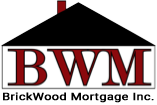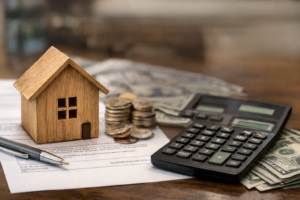Current Mortgage Loan Rates in South Carolina
30 Year
Fixed
Rate: 5.99% | APR 6.144
15 Year
Fixed
Rate: 5.25% | APR 5.496
FHA 30 Year
Fixed
Rate: 5.49% | APR 6.713
VA 30 Year
Fixed
Rate: 5.375% | APR 5.518
Whether you’re trying to buy your first home or have been through the process before, the term ‘loan rates’ probably brings some nerves. After all, the rates you receive on your mortgage can determine the amount you pay for your property for 15 or 30 years. Without experience in the field, you’re likely to have questions about:
- 30-year fixed mortgage rates
- 15-year fixed mortgage rates
- 30-year fixed FHA loan rates
- 30-year fixed VA loan rates
With this in mind, we’ve compiled some of the most common questions (and their answers). By the end, you should have a better understanding of how mortgage loan rates work and how important they are when purchasing or refinancing a property.
Of course, don’t be afraid to contact the team at BrickWood Mortgage, Inc. to learn more about mortgage interest rates, purchasing, refinancing, and getting the best mortgage for you.
How will my mortgage rate be calculated?
Ultimately, a selection of your personal details will combine with the property details to determine the final mortgage rate. For example, your income and credit score play important roles in the process. After all, lenders want to know that you can repay any loan they offer. If you have good income and a solid credit score, this tells lenders that you are in a strong position to repay a loan and will be unlikely to default.
In terms of the property itself, some things taken into consideration include the property price, loan type, and down payment. As you can see above, the average rates vary depending on the type of loan. For example, 15-year fixed mortgage rates are different from 30-fixed rates. Likewise, both of these will have different average rates to 30-year FHA loan rates and 30-year VA loan rates.
All in all, interest rates are based on risk. The lower the credit score, the riskier the loan. The riskier the loan, the higher the rate. As a borrower, you need to do what you can to reduce the risk for the lender and position yourself as a reliable borrower.
Is it best to choose the lender with the lowest rate?
While this might seem like the best financial decision, you shouldn’t immediately jump for the lowest rate without considering the whole picture. Some lenders charge points or upfront fees at closing to offer lower interest rates. For some buyers, this makes sense. However, it might make more sense for buyers with limited cash to keep their cash now until their income goes up in the future. If you don’t plan on living in the property long-term, paying points for a lower interest rate is often best avoided.
When working with a reliable broker like BrickWood Mortgage, inc. you will receive tailored advice so that you end up with the perfect mortgage.
How frequently do rates change?
As you start on the home-buying journey, you’ll see that rates tend to change each day (in some cases, they can change more than once per day!). Why? Because mortgage rates change with the market and the market is constantly moving and evolving. As well as looking at rates online, you should also check when they were last updated to ensure you are comparing current rates.
How does a conventional fixed-rate mortgage work?
A conventional mortgage is any mortgage loan that is not backed or insured by the federal government. As well as fixed conventional loan programs, you’ll also find adjustable conventional loan programs. Typically, the most popular conventional mortgage is the 30-year fixed mortgage as the mortgage payment is fixed for the entire 30-year life of the loan.
In terms of the different lengths, a 15-year mortgage will take 15 years to pay off while a 30-year mortgage will take 30 years. With this in mind, the monthly payments for the latter will be lower since you’re spreading the cost of the loan over a longer period. In some cases, this allows prospective buyers to choose a more expensive home.
With so many conventional loan options to choose from, we highly recommend contacting a mortgage broker to ensure you avoid common pitfalls and select the best mortgage for your situation.
How do I get the best rate when buying or refinancing?
While you can go through the process alone, we highly recommend working with experts like BrickWood Mortgage, Inc. because we have experience and expertise in the market. With professionals by your side, you can make more informed decisions and capitalize on the best opportunities.
For example, one of the biggest mistakes people make when refinancing is ending up on a much higher interest rate. If you buy or refinance at the right time, you’ll get a mortgage and rate that suits your financial position.
What Our Customers Are Saying
Jack McManus
Had a great experience with Brickwood Mortgage. The ongoing communication and follow up was spot on. Paul has a great way of explaining everything and
Devon Ussher
As a first time home buyer, I was nervous about the process. Tim made this so easy to understand and helped every step of the
James Albaugh
Paul Hankins is an absolute mortgage rockstar! I can’t begin to explain how grateful and thankful that I was to have this guy working on
Loan Rates FAQS
The answer to this question depends on several factors, including the lender you are borrowing from, your credit score, and the type of loan you are applying for. Generally, the best interest rate for a mortgage loan is one that provides a lower monthly payment without putting too much strain on your budget. To find the lowest interest rate, shop around and compare rates from multiple lenders; it’s also worth working with a company that can scour the market for you and compare rates (like BrickWood Mortgage, Inc.)
Yes, construction loan rates tend to be higher than mortgage loan rates. This is because of the risk involved in financing a construction project; lenders must account for a range of variables that can affect the success of the project, including potential delays and cost overruns. Furthermore, construction loans are typically shorter-term loans, and lenders may charge a higher rate of interest to compensate for the shorter repayment period.
It depends – home equity loan rates may be lower than mortgage loan rates if you have substantial equity in your home and a strong credit score. However, if you do not have enough equity or a good credit score (or both), your home equity loan rates may be higher than mortgage rates.
When calculating the interest on a mortgage loan, you need two figures; the outstanding amount on your loan and the interest rate. Once you multiply these together, you’ll have an idea of the interest payable. With fixed rates, variable rates, and other variables, it’s always best to work with experts to get a stronger understanding of your mortgage.
Latest Blog
Stay Informed with Our Latest Posts and Articles
How Fast Can You Refinance a House with a Conventional Mortgage?
Purchasing a home is one of life’s biggest financial accomplishments....
Read MoreCan You Use an FHA Loan for an Investment Property?
We have all seen it before with new real estate...
Read MoreHECM Program Pros and Cons: Is a Reverse Mortgage Right for You?
As mortgage brokers, we frequently meet with clients who have...
Read MoreWhat Income Do You Need for a $800,000 Mortgage: Payment Guide
Purchasing a home can be one of the most extensive...
Read More



